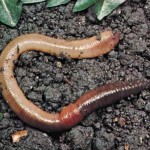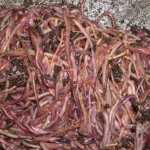I spent last weekend at the Clearwater Festival in the Activist area at the Transition Westchester tent talking to people about the Transition Towns movement and about worm composting. My worm bin was a huge hit, many people stopped in to visit the worms and to meet the Worm Women of Westchester.
You learn loads by talking with people about composting for two days straight. One thing that became clear to me is that most people are not up to speed with what worms do. All worms are not the same! The worms you find in your garden or outdoor compost pile are not the same as my little red wriggling compost worms! Let me explain.
There are loads of different worms in the world more than 4500 species of worms are known to exist. Of those about 2500 are known as earthworm species. Earthworms either work to move the earth or to compost organic matter. The worms that are earthmovers tend to work solo tunneling through the earth, aerating, decompacting, and mixing different soil layers stirring things up and thus making surface nutrients available to plant roots at lower levels. Worms who composters live in communities in organic matter on the soil surface, where they consume bacteria present in dead vegetation, animals and manure, turning it into worm castings and humus.
Outdoor worms that you are no doubt familiar with are typically known as “Night Crawlers” these big guys live a solitary lifestyle. They burrow up to 8 feet deep into the ground and live there for the winter. Their benefit in your garden is mainly from the work they do to aerate the soil as they burrow up down and all around.
Composting worms, namely the Red Wriggler worm are the ones in my worm bin who transform organic matter- veggie scraps- into valuable fertilizer which is more nutrient dense than regular compost. If you put red wriggler compost worms in your outdoor compost pile, they won’t make it through the winter. If you put nightcrawlers into your worm bin, they will escape because they are loners and don’t like to live in captivity!
Red Wriggler worms have no problem living in community. Put a watermelon rind in your worm compost system and you’ll see them crawling all over each other having a grand old time gobbling up every last bit of melon and transforming it into fertilizer.
Want to host a worm composting workshop in your home or business?
Send me an email at wormwomen@gmail.com and let’s set it up!



